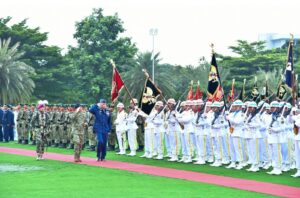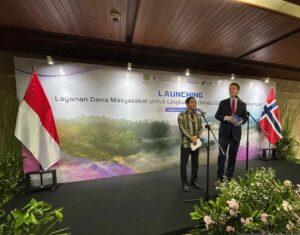BRI cooperation must not be politicized: Jokowi

Beijing, The Gulf Observer: Indonesian President Joko Widodo (Jokowi) stated that cooperation in the Belt and Road Initiative (BRI) initiated by the Chinese government should not be politicized for the interests of certain parties.
“Amid a divided world situation, BRI cooperation must not be politicized,” Jokowi emphasized during his remarks at the opening of the 3rd Belt and Road Forum (BRF) Summit at the Great Hall of the People, Beijing, China, on Wednesday.
The president also extended his congratulations on the initiative that has been ongoing for a decade.
“I hope that BRI’s synergy in infrastructure development would continue to be strengthened,” he remarked.
Jokowi underscored that the synergy in BRI also requires joint efforts to maintain the initiative’s core value to become stronger and impactful.
“Synergy allows the host country to run its national project independently because the sense of ownership is very important for the sustainability of this project (BRI),” he affirmed.
The head of state highlighted that Indonesia has recently inaugurated the Jakarta-Bandung Fast Train (KCJB) that has been synergized with BRI.
“In future, we will also synergize the development of the new capital city (IKN) Nusantara, energy transition, and industrial downstreaming,” he remarked.
At the opening ceremony of the summit, Jokowi delivered his remarks after Chinese President Xi Jinping, Russian President Vladimir Putin, and Kazakhstan President Kassym-Jomart Tokayev.
Argentina President Alberto Fernandez and UN Secretary-General António Guterres also delivered remarks at the event.
Also accompanying President Jokowi in attending the opening of the 3rd BRF Summit were Cabinet Secretary Pramono Anung, interim Coordinating Minister for Maritime Affairs and Investment as well as State-Owned Enterprises (SOEs) Minister Erick Thohir, Trade Minister Zulkifli Hasan, and Indonesian Ambassador to China Djauhari Oratmangun.
The Belt and Road Initiative was introduced by President Jinping in 2013 under the name “One Belt, One Road” (OBOR).
This initiative aims to revive the glory of the Silk Road in the 21st century by involving massive investment and infrastructure development in 152 countries spread across Europe, Asia, the Middle East, Latin America, and Africa.
The BRI is divided into two main components: the Silk Road Economic Belt and the 21st Century Maritime Silk Road.
The Silk Road Economic Belt is a land route connecting China to Central Asia, the Middle East, and Europe, while the 21st Century Maritime Silk Road is a sea route connecting China to Southeast Asia, South Asia, the Middle East, and Africa.
The Asian Infrastructure Investment Bank (AIIB) was then established to raise funding for BRI infrastructure projects.
China has the largest stake in AIIB, with 26 percent, while Indonesia is the eighth-largest capital depositor country, amounting to US$672 million, paid in stages over five years.
Infrastructure projects in Indonesia that receive funding from AIIB include energy, water management, agriculture, and rail-based transportation projects, such as Light Rail Transit (LRT) and high-speed railways.
At least 147 countries have agreed on the BRI program, including on the construction of the KCJB in Indonesia, the China-Laos train, the China-Europe express train, and the Mombasa-Nairobi train.


